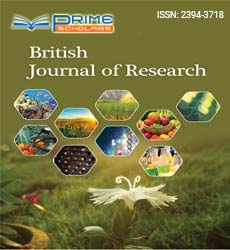Opinion - (2023) Volume 10, Issue 6
Unused Contemplations of Wellbeing Incongruities inside Sensitivity and Immunology
Yoram Vodovotz*
Department of Surgery, University of Pittsburgh, USA
*Correspondence:
Yoram Vodovotz,
Department of Surgery, University of Pittsburgh,
USA,
Email:
Received: 31-May-2023, Manuscript No. IPBJR-23-17173;
Editor assigned: 02-Jun-2023, Pre QC No. IPBJR-23-17173 (PQ);
Reviewed: 16-Jun-2023, QC No. IPBJR-23-17173;
Revised: 21-Jun-2023, Manuscript No. IPBJR-23-17173 (R);
Published:
28-Jun-2023, DOI: 10.35841/2394-3718-10.6.60
Introduction
Immunology is the branch of biomedical science that deals with
the study of the immune system. It is a fascinating field that
explores the body’s defence mechanisms against infections,
diseases, and foreign substances. Immunologists work tirelessly
to understand how the immune system functions, how it
distinguishes between “self” and “non-self” entities, and how
it orchestrates a remarkable defines to keep us healthy. This
article will delve into the intricacies of immunology, exploring
the various components of the immune system, its response
mechanisms, and its role in health and disease. The immune
system is a highly complex network of cells, tissues, and organs
that collaborate to defend the body against harmful invaders.
Its primary function is to differentiate between self and
non-self-substances. This ability to recognize “self” from “nonself”
is critical for the immune system to avoid attacking the
body’s own cells, which could lead to autoimmune diseases.
The immune system comprises two main arms: The innate immune
system and the adaptive immune system. The innate immune
system provides immediate, non-specific defines mechanisms,
while the adaptive immune system provides a tailored,
specific response to particular threats. The innate immune system
is the 1st line of defence. It includes physical barriers like
the skin and mucous membranes, as well as various cellular
and molecular components such as phagocytes (neutrophils
and macrophages), natural killer cells (NK cells), and complement
proteins. These components work together to identify
and eliminate invading pathogens swiftly.
Description
The adaptive immune system, on the other hand, relies on the
ability to recognize and remember specific pathogens it has encountered
before. This system’s key players are B lymphocytes
and T lymphocytes. B cells produce antibodies that can target
and neutralize specific pathogens, while T cells have various
functions, including directly killing infected cells and helping
B cells in antibody production. When the immune system detects
a foreign invader, it initiates a coordinated and complex
immune response to eliminate the threat. This response can
be divided into several phases: The process begins with antigen
recognition and presentation. Antigens are specific molecules
or parts of pathogens that trigger an immune response.
Antigen-Presenting Cells (APCs) like dendritic cells engulf and
digest pathogens, presenting antigen fragments on their cell
surface. These antigens are then recognized by T cells, initiating
the adaptive immune response. When T cells encounter antigen-
presenting cells displaying the antigen fragments, specific
T cells become activated. Helper T cells (CD4+ T cells) stimulate
other immune cells, while cytotoxic T cells (CD8+ T cells) directly
target and destroy infected cells. Simultaneously, B cells bind
to the same antigens displayed on APCs. This binding activates
B cells, leading to their differentiation into plasma cells. Plasma
cells are antibody factories that produce and release large
quantities of antibodies into the bloodstream.
Conclusion
Immunology is a fascinating and ever-evolving field that holds
the key to understanding how our bodies defend against infections,
diseases, and foreign substances. From the innate immune
response’s immediate actions to the adaptive immune
system’s sophisticated memory, the immune system is an extraordinary
defence mechanism that safeguards our health.
While challenges like autoimmune diseases and immunodeficiency
disorders persist, immunology also offers hope through
innovative treatments like immunotherapy. As research in immunology
continues to advance, the future holds the promise
of more personalized and effective approaches to enhance the
immune system’s ability to protect and heal us.
Citation: Vodovotz Y (2023) Unused Contemplations of Wellbeing Incongruities inside Sensitivity and Immunology. Br J Res. 10:60.
Copyright: © 2023 Vodovotz Y. This is an open-access article distributed under the terms of the Creative Commons Attribution License, which permits unrestricted use, distribution, and reproduction in any medium, provided the original author and source are credited.

